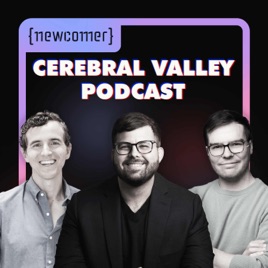
Advertise on podcast: Newcomer | Cerebral Valley Podcast
Rating
4.4 from
Country
This podcast has
108 episodes
Language
Publisher
Explicit
No
Date created
2021/08/24
Average duration
66 min.
Release period
10 days
Description
Ahead of the 2nd Cerebral Valley AI Summit on Nov. 15, hosts Eric Newcomer, Max Child, and James Wilsterman bring you a six-part podcast series on the rise of generative artificial intelligence. www.newcomer.co
Social media
Check Newcomer | Cerebral Valley Podcast social media presence
Podcast episodes
Check latest episodes from Newcomer | Cerebral Valley Podcast podcast
Two Titans on the Future of AI (with Reid Hoffman & Vinod Khosla)
2023/11/30
Today, we have a double episode for you — two conversations from the Cerebral Valley AI Summit.
Reid Hoffman was fresh off a meeting with President Joe Biden when Hoffman and I sat down on stage at the Cerebral Valley AI Summit Nov. 15. On stage, he told us that working to get Biden elected next year is one of his top priorities.
Then, I sat down with the ever-feisty Vinod Khosla. The investor called for a TikTok ban and more welcoming immigration policies while warning against open-source artificial intelligence projects.
Thousands of enterprises around the world rely on Oracle Cloud Infrastructure (OCI) to power applications that drive their businesses. OCI customers include leaders across industries, such as healthcare, scientific research, financial services, telecommunications, and more.
NVIDIA DGX Cloud on OCI is an AI training-as-a-service platform for customers to train complex AI models like generative AI applications. Included with DGX Cloud, NVIDIA AI Enterprise brings the software layer of the NVIDIA AI platform to OCI.
Talk with Oracle about accelerating your GPU workloads.
Hoffman Plans to Go Big for Biden
Hoffman, fresh off a meeting with President Biden, kicked off the afternoon with a strong endorsement of the President’s record. Hoffman praised Biden for his recent executive order on artificial intelligence.
Reid called himself “a 95%-98% supporter” of the executive order, endorsing provisions on reporting and monitoring, “red team” testing, and voluntary commitments by companies that might eventually be enforced via the Defense Production Act. But he pushed back on the idea that the FTC should be monitoring the AI industry for anti-competitive conduct.
“Startups are not being impeded right now,” he asserted, despite the apparent dominance of OpenAI and the mega-cap tech companies. Reid sits on the board of Microsoft, and offered that he was in fact “first money in” on OpenAI, through his personal foundation, but he’s not concerned about, er, his own companies having too much power. “I don’t think it constrains competition on any level.”
Hoffman is always happy to engage on policy, and I asked him what he thought about Marc Andreessen’s recent “techno-optimist” manifesto, which denigrates the very idea of government oversight. Reid said he was a techno-optimist too, and half-joked that Andreessen “quoted kind of liberally from things I’ve written and said” without any attribution. But Hoffman said that he’s not on board with Andreessen’s approach. “It’s kind of dumb to think that when you have major technologies there can’t be negative side effects,” he said, noting that all his AI projects have safety teams. “Tech can be amazing. Let’s be intentional about building.”
Khosla Wins Cheers from the Cerebral Valley Audience
Venture capitalist Vinod Khosla confirmed that his firm, boosted by an early stake in OpenAI, was about to close on $3 billion in commitments for a new fund. Valuations are high, he said, “but just because valuations are high doesn’t mean it isn’t a good time to invest.”
He’s not buying existential risk, calling it “nonsensical” talk from academics who had nothing better to do. But he’s long on China risk, saying the U.S. is in a “techno-economic war” with China and needs to fight hard. “I would ban TikTok in a nano-second,” he said, unlike his predecessor on stage, Hoffman, who Khosla said he very much admired. Khosla is firmly against open-source AI models as well due to the China risk.
Bio-risk and cyber risk are real concerns too, he noted.
But if China or rogue viruses don’t kill us, Khosla thinks the near-future is very bright: “I do think in 10 years we’ll have free doctors, free tutors, free lawyers” all powered by AI.
Khosla also gave a grudging endorsement of the Biden Executive Order, saying it was “okay.”
But like most Silicon Valley moguls, he has no time for antitrust issues
more
Databricks CEO Ali Ghodsi & MosaicML Founder Naveen Rao Speak at Cerebral Valley
2023/11/21
We were delighted to kick off the 2nd Cerebral Valley AI Summit with Ali Ghodsi, CEO of Databricks, and Naveen Rao, co-founder of MosaicML.
Their encounter at our debut event in March led to Ghodsi buying Rao’s company, which had little revenue, for $1.3 billion. At our event on Nov. 15, the two discussed how the deal came together quickly after meeting at the conference dinner.
Thousands of enterprises around the world rely on Oracle Cloud Infrastructure (OCI) to power applications that drive their businesses. OCI customers include leaders across industries, such as healthcare, scientific research, financial services, telecommunications, and more.
NVIDIA DGX Cloud on OCI is an AI training-as-a-service platform for customers to train complex AI models like generative AI applications. Included with DGX Cloud, NVIDIA AI Enterprise brings the software layer of the NVIDIA AI platform to OCI.
Talk with Oracle about accelerating your GPU workloads.
Ghodsi recounted how he started spending some time with Rao and thought, “these guys are pretty good,” and then by chance noticed an employee he respected poking around with MosaicML and offering a strong endorsement. Soon Ghodsi was on the phone with the head of his deals team, who told him “if you want to buy these guys you have to do it this weekend.” Rao said by that point “you kind of know he’s going to pop the question,” and once they worked out the money, the deal was done.
The two executives certainly seemed to be in harmony as they touted the potential benefits from their combination, which in simple terms will bring MosaicML’s expertise in building specialized generative AI models to Databricks’ corporate data platform products, essentially super-charging Databricks for the generative AI era.
They were eager to defend the idea of open-source foundation models that are specific to certain tasks, rejecting the notion that general-purpose models like ChatGPT-4 will eventually swallow everything. (This conversation took place before OpenAI was thrown into chaos by its board of directors.)
Ghodsi said calls to limit open-source models on the grounds that they’ll be too easily exploited by bad actors a “horrible, horrendous” idea that would “put a stop to all innovation.”
“It’s essential that we have an open-source ecosystem,” he said, noting that even now it’s unclear how a lot of AI models work, and open-source research will be critical to answering those questions.
Rao added that many of the people making predictions about how AI would develop are “full of s**t.” On the safety question, he noted that cost alone would stand in the way of any existential risks for a long time, and in the meantime the focus should be on real threats like disinformation and robot safety.
Give it a listen
Get full access to Newcomer at www.newcomer.co/subscribe
more
The Artificial Intelligence Startup Draft
2023/11/14
If you could amass any five artificial intelligence startup bets right now, which companies would you pick?
My Cerebral Valley co-hosts and I took a stab at answering that question with an artificial intelligence startup draft.
Our startup draft starts at 27:35 after a discussion of some of the biggest themes going into this week’s Cerebral Valley AI Summit.
The draft gave us a chance to dissect some of the most promising startups in artificial intelligence right now.
The goal was to amass five companies with the biggest valuation five years from now. We restricted ourselves to AI startups that had raised more than $100 million.
I encourage you to make your own prediction in the comments.
Give it a listen
Get full access to Newcomer at www.newcomer.co/subscribe
more
Chip War (with Chris Miller)
2023/11/10
For this week’s episode, I spoke with Chris Miller, the author of Chip War, about the rise of Nvidia.
While OpenAI gets the lion’s share of the public adulation for the sudden excitement about generative intelligence, Nvidia’s H100 chips are powering much of the generative AI frenzy. Nvidia’s stock has climbed over 200% over the past 12 months. And the company has become a key investor in generative AI startups.
Miller (who comes on the show around the 41-minute mark) talks through Nvidia’s history and the geopolitical war raging over the production of chips.
In the first part of the episode, Cerebral Valley AI Summit co-hosts Max Child, James Wilsterman, and I discuss how big technology companies are working to fend off this new generation of AI startups.
Give it a listen
Get full access to Newcomer at www.newcomer.co/subscribe
more
The AI Personal Stack (with Joshua Browder)
2023/11/01
I’m back from my honeymoon in Japan. Thanks for sticking with the newsletter as I celebrated my wedding this year. Expect more of my newsletter writing soon.
If you have tips or story ideas for me, you can always reach out at eric@newcomer.co.
I hope you’ve been enjoying the Cerebral Valley podcast series while I’ve been gone. If you missed the first three episodes, you can check them out in the links below:
* The Cerebral Valley Podcast: Artificial Intelligence Becomes Reality
* AI Kills Us All (with Daniel H. Wilson)
* Someday That NPC Could Be More Alive Than You Are (w/ Amy Wu & Keith Kawahata)
On this week’s episode of our Cerebral Valley podcast, co-hosts Max Child, James Wilsterman, and I talk about how artificial intelligence is actually affecting our lives today.
Then at the 34:40 mark, I talk with DoNotPay CEO Joshua Browder. His company is helping consumers cancel their gym memberships, dispute charges, and otherwise stand up to big corporations.
Browder got some heat for planning to have an artificial intelligence-powered lawyer argue in court. Ultimately, he reversed course under pressure from the legal world.
Browder envisions a world where AI is fighting other AIs. Companies use artificial intelligence to power their chatbots and to handle customer support. Consumers need to be armed with similarly powerful AI-powered tools to resist those companies.
Give it a listen
Get full access to Newcomer at www.newcomer.co/subscribe
more
Someday That NPC Could Be More Alive Than You Are (w/ Amy Wu & Keith Kawahata)
2023/10/24
Video games often represent the frontier of any new technology. Many of the most popular applications in the initial iPhone app store were games. Today’s virtual reality devices are dominated by video games.
Artificial intelligence seems poised to upend the video game business and entertainment more broadly.
On the third episode of our six-part Cerebral Valley podcast series, Max Child, James Wilsterman, and I game out how artificial intelligence could reshape the media we consume.
It helps that Max and James are the co-founders of Volley, which builds AI-enabled games. They develop many of the most popular voice games on the Amazon Alexa and smart TV platforms like Roku.
Max and James have been deep in the trenches of conversational-style gaming and have spent a lot of time thinking about how humans interact with ever smarter computers.
In the second half of the episode, I talk with Menlo Ventures partner Amy Wu, who focuses on gaming and consumer investments, and Keith Kawahata, a former executive at Wargaming, AppLovin, and Kabam, who now has a stealth artificial intelligence gaming startup.
Wu helps to articulate a three-part thesis on how artificial intelligence might change the gaming business. (1) artificial intelligence will help with the creation of the game art and graphics, (2) AI can create more sophisticated non-player characters, and (3) AI can help write the code of the game itself.
One of the things that I was struck by from the conversation is that games may have a big leg up in implementing artificial intelligence over movies — because people interact so much more with a gaming, giving it tons of data to react to. While TikToks can learn what small populations of people like and what an individual likes over a long time, a game could learn a lot about a user in a single play session.
Of course, there are real hurdles left standing. Most notably, text-to-image generation so far is mostly two-dimensional. Despite everything that’s happened, image generation models aren’t just whipping out 3-D levels that are ready to play.
And it could be a while until non-player characters are as smart as humans. But imagine playing a game of Grand Theft Auto or Red Dead Redemption and the characters roaming around the game are self-aware agents with their own thoughts and drives.
Give it a listen
P.S. I’m on my honeymoon right now in Japan. I was working frantically to record these episodes before I left. My chief of staff Riley Konsella is sending the episodes out for me while I’m gone. If you need anything while I’m away, you should email Riley.
Thanks in advance for being understanding that this newsletter is slowing down for my honeymoon. I’m going to dedicate myself to relaxing over the next two weeks so that I come back hungrier than ever.
Get full access to Newcomer at www.newcomer.co/subscribe
more
AI Kills Us All (with Daniel H. Wilson)
2023/10/17
What’s so crazy about this moment in artificial intelligence is that many of the most credible voices in AI think there’s a real chance that this all turns out really, really badly.
Anthropic CEO Dario Amodei recently pegged his “chance that something goes really quite catastrophically wrong on the scale of human civilization” between 10% and 25%.
That’s comforting.
Applications to attend the Cerebral Valley AI Summit close TODAY October 17.
Apply right now to be considered for an invitation!
On the series’ first episode we reflect on how generative artificial intelligence and large language models took Silicon Valley by storm.
So in our second episode of the six-part Cerebral Valley podcast, Max Child, James Wilsterman, and I played out the doomsday scenarios. We talked a lot about science fiction and how writers have imagined artificial intelligence turning dystopian.
In the second half of the episode, I talked with science fiction author Daniel H. Wilson. He wrote the books How to Survive a Robot Uprising, Where’s My Jetpack?, and How to Build a Robot Army. Wilson has also consulted with the military to help them game out how dystopian technologies might unfold.
Of course, even in the Anthropic CEO’s estimation, the most likely scenario is probably a more boring one: artificial intelligence doesn’t try to secretly destroy us as we sleep in our beds.
But the fact that there’s a chance is certainly worth considering.
I open our conversation with the parable “The unfinished fable of the sparrows” from Nick Bostrom’s Superintelligence.
It was the nest-building season, but after days of long hard work, the sparrows sat in the evening glow, relaxing and chirping away.
“We are all so small and weak. Imagine how easy life would be if we had an owl who could help us build our nests!”
“Yes!” said another. “And we could use it to look after our elderly and our young.”
“It could give us advice and keep an eye out for the neighborhood cat,” added a third.
Then Pastus, the elder-bird, spoke: “Let us send out scouts in all directions and try to find an abandoned owlet somewhere, or maybe an egg. A crow chick might also do, or a baby weasel. This could be the best thing that ever happened to us, at least since the opening of the Pavilion of Unlimited Grain in yonder backyard.”
The flock was exhilarated, and sparrows everywhere started chirping at the top of their lungs.
Only Scronkfinkle, a one-eyed sparrow with a fretful temperament, was unconvinced of the wisdom of the endeavor. Quoth he: “This will surely be our undoing. Should we not give some thought to the art of owl-domestication and owl-taming first, before we bring such a creature into our midst?”
Replied Pastus: “Taming an owl sounds like an exceedingly difficult thing to do. It will be difficult enough to find an owl egg. So let us start there. After we have succeeded in raising an owl, then we can think about taking on this other challenge.”
“There is a flaw in that plan!” squeaked Scronkfinkle; but his protests were in vain as the flock had already lifted off to start implementing the directives set out by Pastus.
Just two or three sparrows remained behind. Together they began to try to work out how owls might be tamed or domesticated. They soon realized that Pastus had been right: this was an exceedingly difficult challenge, especially in the absence of an actual owl to practice on. Nevertheless they pressed on as best they could, constantly fearing that the flock might return with an owl egg before a solution to the control problem had been found.
Give it a listen.
P.S. I’m on my honeymoon right now in Japan. I was working frantically to record these episodes before I left. My chief of staff Riley Konsella is sending the episodes out for me while I’m gone. If you need anything while I’m away, you should email Riley.
Thanks in advance for being understanding that this newsletter is slowing down for my h
more
The Cerebral Valley Podcast: Artificial Intelligence Becomes Reality
2023/10/10
In the past 12 months, it has felt like “AI” transformed from a pair of letters that companies affixed to their latest product announcements to get some extra marketing luster to the shorthand for a genuine technology revolution.
ChatGPT, Dall-E, Midjourney, and more showed the world what artificial intelligence is now capable of doing.
Then, the funding started pouring in for every startup that had anything to do with those two letters. Every venture firm needed to bet on their own foundational model and every startup needed to get its hands on Nvidia’s H100s to train their own foundation models.
Ahead of the 2nd Cerebral Valley AI Summit on Nov. 15, I wanted to really take stock of how we got here. So I teamed up with my conference co-hosts Max Child and James Wilsterman to bring you a six-part podcast series on the rise of generative artificial intelligence.
You can apply to attend the Cerebral Valley AI Summit here. Applications close Oct. 16.
On the series’ first episode we reflect on how generative artificial intelligence and large language models took Silicon Valley by storm.
With the help of ChatGPT, we consider the top research papers that brought us here, the most important historic milestones along the journey, the key artificial intelligence products on the market today, and how artificial intelligence is already impacting our lives.
The show is fun and and lighthearted. I hope it’s a little more accessible than the usual fodder on the Newcomer podcast. For instance, on a future Cerebral Valley episode, we’re going to do a draft pick of what we think will be the most valuable AI startups. On upcoming episodes, I interview guests like Daniel H. Wilson — author of How to Survive a Robot Uprising, Where's My Jetpack? and How to Build a Robot Army — and DoNotPay CEO Joshua Browder.
If you’ve never listened to the Newcomer podcast before, this is a good time to give it a shot. Die-hard podcast listeners will remember Max and James, who are the founders of the AI voice games company Volley, from my January episode on augmented reality.
Whether you can make it to Cerebral Valley in person or not, my hope is that this series is a solid primer as to what exactly has been going on in the business of artificial intelligence. I follow this stuff super closely and until we got organized for this podcast series there was so much that I hadn’t learned.
I know most of you won’t be able to come to the conference in person, but there will be a virtual conference in this newsletter. We will publish recordings from the summit on our YouTube channel and send out some of our favorites over the podcast feed. So this is your lively refresher on all the crazy stuff that happened in Silicon Valley artificial intelligence startups this year.
Give it a listen.
Apply to attend the Cerebral Valley AI Summit here. Applications close Oct. 16.
P.S. I’m on my honeymoon right now in Japan. I was working frantically to record these episodes before I left. My chief of staff Riley Konsella is sending the episodes out for me while I’m gone. If you need anything while I’m away, you should email Riley.
Thanks in advance for being understanding that this newsletter is slowing down for my honeymoon. I’m going to dedicate myself to relaxing over the next two weeks so that I come back hungrier than ever.
Get full access to Newcomer at www.newcomer.co/subscribe
more
Life Extension Innovations, Moonshots & Snake Oil (with Celine Halioua & James Peyer)
2023/09/27
I brought two top Silicon Valley entrepreneurs working on extending lifespans on the Newcomer podcast this week.
One of them is trying to help people live longer. The other, their dogs.
James Peyer, the CEO of Cambrian Bio, is acquiring majority stakes in drugs that could combat a particular illness while showing promise for broader use among healthy humans. Meanwhile, Celine Halioua, the CEO of Loyal, is developing drugs to make dogs live longer.
Fundamentally life extension, or longevity, is about finding drugs and treatments that can be given to healthy humans to help them live longer, healthier lives. Instead of just treating illnesses, entrepreneurs in the space want to find ways to stave off aging in already healthy people.
The space has long been a fascination of mine. In February 2022, I profiled Elad Gil’s investments in an array of companies looking to make healthy humans live longer, healthier lives.
The HBO show Silicon Valley helped popularize the idea that Silicon Valley elites were pumping their veins with younger people’s blood. (I’ve yet to get anyone to confess to me that they’re buying plasma.)
To the chagrin of this week’s guests, one tech mogul desperate to avoid death has received a lot of the attention recently. That’s Braintree founder Bryan Johnson.
Time magazine just profiled Johnson under the headline “The Man Who Thinks He Can Live Forever.”
Johnson, 46, is a centimillionaire tech entrepreneur who has spent most of the last three years in pursuit of a singular goal: don’t die. During that time, he’s spent more than $4 million developing a life-extension system called Blueprint, in which he outsources every decision involving his body to a team of doctors, who use data to develop a strict health regimen to reduce what Johnson calls his “biological age.” That system includes downing 111 pills every day, wearing a baseball cap that shoots red light into his scalp, collecting his own stool samples, and sleeping with a tiny jet pack attached to his penis to monitor his nighttime erections. Johnson thinks of any act that accelerates aging—like eating a cookie, or getting less than eight hours of sleep—as an “act of violence.”
Even as Johnson is getting a lot of attention for his self-experimentation, there’s a growing view that there could be something credible behind Silicon Valley’s interest in life extension. The Economist just wrote that “slowing human ageing is now the subject of serious research.”
Many in mainstream science and medicine look at all this slightly askance. That is understandable. It is an area which attracts chancers and charlatans as well as those with more decent motives, and its history is littered with “breakthroughs” that have led more or less nowhere. America’s Food and Drug Administration does not recognise “old age” as a disease state, and thus as a suitable target for therapy. Nevertheless, evidence has been accumulating that such research might have something to offer.
Some established drugs really do seem to extend life, at least in mice. That offers both the possibility that they might do so in people and some insight into the processes involved. The ever-greater ease with which genes can be edited helps such investigations, as does access to large amounts of gene-sequence data. The ability to produce personalised stem cells, which stay forever young, has opened up new therapeutic options. And new diagnostic tools are now offering scientists means to calculate the “biological ages” of bodies and organs and compare them with actual calendar ages. In principle this allows longevity studies to achieve convincing results in less than a lifetime.
I dug in with Halioua and Peyer about where they saw the most opportunities, how their own companies were progressing, and why they thought Johnson’s publicity campaign was doing a disservice to companies working on longevity.
The duo helped break down the space, discu
more
Fighting for Pro-Crypto Legislation in Sam Bankman-Fried's Shadow (with Chris Lehane)
2023/09/13
Chris Lehane was once the consummate Democratic spin man and campaign wonk. He introduced the world to the vast right-wing conspiracy against the Clintons.
In 2015, Lehane dove into the high-growth startup world. He joined Airbnb to run policy and communications. He taught the home sharing company how to fight nicely with cities, dishing out data and tax cooperation in exchange for favorable local regulations. Unlike Uber’s confrontational approach that had it going to war with Bill de Blasio in New York City, Airbnb tried to foster a cozy relationship with urban policymakers.Airbnb CEO Brian Chesky and President Barack Obama built a tight relationship.
A year ago, just as the crypto winter was starting, Lehane joined Katie Haun’s self-named venture fund, which had raised $1.5 billion. Haun Ventures positioned itself as a leader in regulation, policy, and communications. Haun is a former assistant U.S. attorney. Rachael Horwitz, the firm’s chief marketing officer, once ran communications for Coinbase. And Lehane brought the political experience, especially with Democrats.
But there’s only so much one firm can do to change crypto’s reputation in Washington, especially with Democrats. Sam Bankman-Fried, the former CEO of FTX, had become the crypto world’s standard bearer with Democrats, donating to their campaigns and speaking to their values. Then when Bankman-Fried’s empire unraveled and he headed to jail, many Democrats grew disillusioned with crypto.
This year, two Republican-led House committees moved forward crypto-friendly legislation that would clarify the regulation of crypto currencies and give the Commodities Futures Trading Commission more power to regulate crypto (denying the SEC some of that power). Meanwhile, the Biden appointed SEC chair Gary Gensler has sued crypto exchange Coinbase and Binance for failing to register their exchanges with the SEC.
I invited Lehane on the Newcomer podcast to take stock of crypto’s status in Washington. We talked about the bills working their way through Congress, the SEC lawsuits, and the crypto winter. Lehane and I also talked about how he believed that America needed to embrace a “common sector” that served as a hybrid between government regulation and corporate self-regulation. Think Airbnb data sharing with cities or Facebook’s oversight board. We also commiserated over co-existing with Silicon Valley Republicans in the MAGA era.
Get full access to Newcomer at www.newcomer.co/subscribe
more
He Helps Rich Tech Founders Part With Their Money (with Rey Flemings)
2023/08/29
I spend most of my time here talking about how people earn their money.
Rey Flemings, the chief executive of the YC-backed startup Myria, is an expert at helping people spend it.
For several years, Flemings ran a luxury services consultancy for family offices. In other words, he threw parties in Las Vegas, introduced billionaires to celebrities, rented out private mansions, and helped people acquire things money can’t usually buy.
These days, Flemings is building a startup around the same concept. Letting rich people buy what isn’t on the market. He’s building a marketplace for off-market travel and accommodations. On top of that, he’s spinning up a social network for the ultra wealthy.
Flemings says his average member’s net worth is about $600 million.
I sat down with Flemings to talk about his startup and to understand how Silicon Valley’s most successful people are spending the fantastical sums that they’ve earned in the past few years.
He warned about the unhappiness that sudden fortune can bring, calling it “the success condition.”
We’re all humans. We’re all chasing the American Dream. We’re all chasing success. And when you achieve it, one of the first discoveries that people are shocked by is that you have to pump the brakes. Money doesn’t buy happiness. I was talking with a new client the other day and he said, “Ray, I can’t talk about this publicly, the world would play the world’s smallest violin, but the day I exited triggered the deepest and greatest period of depression in my life.”
Give it a listen.
Highlighted Excerpts
The transcript has been edited for clarity.
There is a phenomenon in Silicon Valley where someone suddenly becomes rich, especially when their entire net worth is tied up in a startup. Finally, they sell the company and now have all this money, but don't really know how to be wealthy or what to buy. What typically happens when somebody sells their company for a billion dollars and gets 300 million of it?
Rey Flemings: First of all, there’s no one-size-fits-all answer, right? We’re different. Significant, sudden, great wealth does come with a particular set of challenges. Zooming out across 15-17 years in this space and looking at all of the folks that work here, zoom all the way out. Let’s just focus on first-generation people who are operating a business and/or they’re doing something presently to amass that wealth. I’ve worked with probably 100-125 folks in that category. I hear the same things over and over, so often that we have even coined a name for it — we call it the Success Condition.
It goes something like this: We’re all humans. We’re all chasing the American Dream. We’re all chasing success. And when you achieve it, one of the first discoveries that people are shocked by is that you have to pump the brakes. Money doesn’t buy happiness. I was talking with a new client the other day and he said, “Ray, I can’t talk about this publicly, the world would play the world’s smallest violin, but the day I exited triggered the deepest and greatest period of depression in my life.”
What ends up happening is we chase the American Dream only to realize it and then we’re like “Wait, why am I not happy? What’s missing here?”
Rich people get sad, depressed and commit suicide just like anyone else. Studies show that beyond about $100,000 a year, any more money doesn’t actually contribute to human happiness. The wealthier and more successful you become, the harder it is to form close interpersonal relationships with people that aren’t in your network.
Break down what was the motivation to do Y Combinator and build more of a tech platform for Myria?
Rey: Fantastic question, Eric. I’d love to sound like I had this all planned out and was so smart with so much foresight. I knew I wanted to build a scalable business with my background. But when I started The Blue, I ran it for 5-6 years before we could start Myria. It was c
more
Hydrogen Space Balloon (with Jane Poynter & Ali Rohde)
2023/08/22
Jane Poynter spent two years and 20 minutes in a biosphere back in the early 1990s. (There’s a documentary about it.)
Later, Poynter set her sights on a mission to Mars. Wired wrote in 2014, “Meet the Couple Who Could Be the First Humans to Travel to Mars.” The story was about Poynter and her husband, Taber MacCallum.
These days, the duo is working together on building a hydrogen balloon that will take tourists to space for $125,000. Poytner came on the podcast to talk about her startup, Space Perspective. We also discussed SpaceX, Elon Musk, Virgin Galactic, and the state of the adventure tourism industry in light of the deep sea deaths on a OceanGate submersible headed to the Titanic.
On the show, Poynter said that Space Perspective, which has about 130 employees, has raised almost $70 million. Prime Movers Lab and LightShed Ventures are major investors, Poynter said. She told us that she hopes to commercial operations “around the end of 2024.”
Venture capitalist, chief of staff newsletter author, and AI event host Ali Rohde joined me as a guest co-host for the episode. (She’s a friend of the show and I’m exploring different podcast episode formats. I always welcome your feedback and advice. In that spirit, I’ll mention that I’m still looking for a podcast producer.)
Think of the episode as part two in my exploration of space startups. Last week, I talked with Delian Asparouhov, the co-founder of Varda Space Industries.
This week, we interrogate space tourism. Give it a listen.
Highlighted Excerpts
The transcript has been edited for clarity.
What if anything did you take away from the OceanGate situation?
Jane: What’s fascinating is we got almost no customer questions or refund requests due to the OceanGate accident. It’s incredibly different from what we do. Also, in the 60+ years of deep ocean submersible operations there had never been a fatal accident until that incident. You have to ask why. I don’t want to focus on OceanGate specifically, but the big takeaway for us was that we embrace regulatory oversight. We want the FAA and Coast Guard to work with us since we also operate at sea. We go so far beyond any standards they would set that it’s good for us and the industry to have that accountability and transparency. That was the main takeaway: We welcome reasonable regulations and oversight.
Space tourism more akin to safaris than Virgin Galactic
Jane: It’s interesting that you talk about Blue Origin and Virgin not being competition because the experience is so differentiated from what we offer. Our experience is more akin to incredible safaris, trips to Antarctica, and other wonder travel that deeply transforms people. That’s why we priced our tickets at $125,000. It’s in line with those kinds of life-changing experiences. When Antarctica tourism opened up, there was a huge demand from people willing to pay high prices for a once-in-a-lifetime trip. We’re seeing incredible excitement and demand from customers wanting to go to space with us. We have an event coming up soon with over 100 of our explorers gathering here, and they all want to connect with each other too. We’re building a real community around spaceflight and this experience. It’s going to be such an extraordinary, bonding experience for people. I truly believe it will bring people together in a deep way.
You mentioned Blue Origin, Virgin, and SpaceX — obviously some of the first names people think of when space is mentioned like Elon Musk and Jeff Bezos. They are controversial figures, likely quite different from our target customer base. But I'm curious. What do you think about them? Are you grateful for how they've helped popularize and mainstream space travel?
Jane: Taber and I worked with Elon before he started SpaceX, so we have an interesting perspective. In the early days of SpaceX, space tourism was considered a joke and the idea that commercial companies could enable space travel or moon/Mars mission
more
Podcast reviews
Read Newcomer | Cerebral Valley Podcast podcast reviews
Jimmy
2023/10/10
Fun and entertaining discussion
Enjoying the new Cerebral Valley miniseries on artificial intelligence and Silicon Valley! Great work to Eric and the Volley team.
The holder
2023/10/10
Cerebral Valley edition is better than ever
I love this podcast more than Sam Altman loves GPUs
lmonocle
2023/10/10
Cerebral Valley
This AI series is exactly what I was looking for right now. Thank you for helping me understand what’s going on!
Johnny-apppooo
2023/10/10
Good guests
Always legit people on here
NA224786
2023/03/18
Awesome insight + hot takes
Eric Newcomer always asks the hard questions and pulls on the most interesting threads. Loyal listener!!
mushbakke
2022/11/15
so
i listen to this for the music intro alone
CoolBreeze4329
2022/08/13
Fun Podcast
Great podcast with interesting guests and a fun dynamic between the hosts! I’m a subscriber to Newcomer
Keepn-it-real
2022/08/31
🤡 show
Really?!?! Taylor Lorenz?
🤡🤡🤡🤡🤡
EmpireAveNY
2021/10/05
Love this podcast!
Great commentary and guests, love the hosts. Always a fun listen and one of my favorite tech podcasts!
PerspectiveEastWest
2022/08/10
Catty gossip
A group of lit nerds from high school, having failed math and/or other technical subjects and can’t make it as engineering majors in college, grows ol...
more
Podcast sponsorship advertising
Start advertising on Newcomer | Cerebral Valley Podcast & sponsor relevant audience podcasts
You may also like these tech news Podcasts
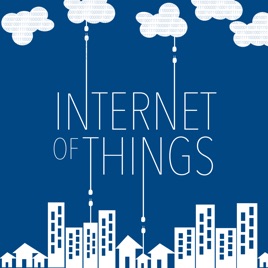
4.4
202
440
The Internet of Things Podcast - Stacey On IoT
Stacey Higginbotham, tech journalist
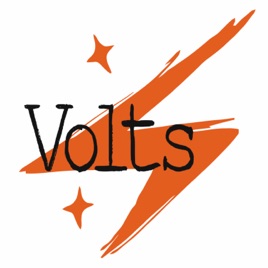
4.8
354
226
Volts
David Roberts
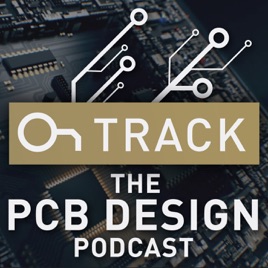
5
20
100
OnTrack: The PCB Design Podcast
Altium LLC.
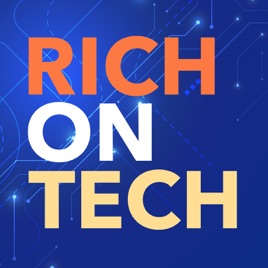
4.8
346
422
Rich On Tech
Rich DeMuro

4.4
31
108
Newcomer | Cerebral Valley Podcast
Eric Newcomer | newcomer.co

4.6
2036
671
Rebel FM
Eat-Sleep-Game.com Staff

3.9
7
275
IGN Daily Update
IGN

4.6
10
58
PRUSA 3D Printing Podcast
Prusa3D

4.4
533
350
The Clip Out - The Peloton Fan Podcast
theclipout.com

3.3
15
662
FOX on Tech
FOX News Radio



